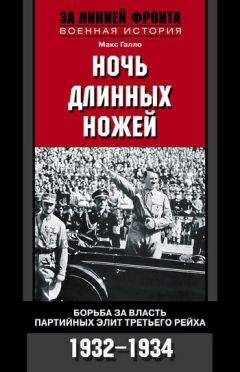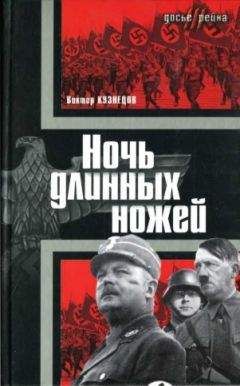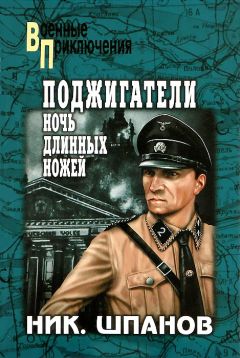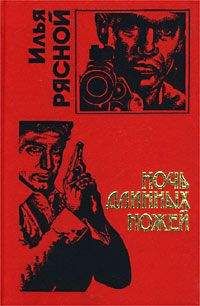Michael Dibdin - Dark Specter
At first I tried to ignore the whole thing and go back to sleep, but a combination of curiosity and anxiety made this impossible. I knew that Mark was in a snit about my presence, and assumed that this must be the cause of the conflict. But in that case why didn’t Sam just tell him I was leaving? If there was a problem with this, it was something I needed to know about. I was already uneasily aware that I could not get off the island without Sam’s cooperation. The idea of being trapped there against my will, even for another day, seemed intolerable.
I got out of bed and crept to the door. I cautiously turned the handle, opened the door an inch or so and looked out, but the speakers were not in my field of view and I was afraid to draw attention by opening the door any further. Despite the flabby acoustics of the hall, I could hear much of what was being said, particularly when, as was often the case, it was actually being shouted. I was also able to put names to the other two men, Rick and Andy.
In the course of the next ten minutes, I gradually pieced together a few elements of the story. What escaped me was its significance, and above all any clue to why Mark was making such a big deal of it. What it seemed to come down to was that the guy called Russell, who was away, had failed to phone them. The whole thing sounded absurd to me, like Mom and Dad losing it because their twenty-year-old son hadn’t called in to tell them what time he’d be home. There was also some talk about the one called Dale. I remembered Sam saying that he had left the group. It was now clear that his departure had created tensions, and that Mark was worried that Russell might go the same way.
“Anything could’ve happened,” he yelled at one point. “We can’t just sit around here with our thumbs up our butts. We got to find out!”
Sam’s reply was too quiet for me to hear, but it evidently defused the situation somewhat.
“OK, it’s a deal,” Mark said grudgingly. “But if we don’t hear tomorrow, we got to do something.”
Sam’s response was again inaudible.
“Well, I do!” Mark snapped, his old charmarola self again. “I’ll run over to Friday, put in a call to one of the papers, radio station, something. If anything happened, they’ll have heard. And they better have, or you’re fresh out of excuses.”
Sam raised his voice for the first time.
“I have revealed the Secret to you, and raised you up unto eternal life! And what the fuck thanks do I get in return? You guys whining and bitching and scheming and sowing the seed of discord here in Beulah! Sure I was deceived by Dale. We all were. I just hope I haven’t been deceived by you, Mark! For I am Los, prophet of the true God, and all those who seek to deceive me shall be exposed and cast out into Ulro, where the dead wail night and day!”
With this, Sam stomped off to his quarters on the other side of the hall, slamming the door behind him. Mark, Andy and Rick retired to Rick’s room, next to mine, where they continued to talk until well into the night. I heard the drone of their voices through the wall, but it was impossible to make out what they were saying.
I lay awake for hours, trying and failing to make sense of all this.
13
By the time the uniforms reached the scene, there wasn’t a lot that could be done. The black victim lay stretched out in a puddle of blood, his body contorted, scowling like a newborn baby. One of the white guys was dead too, with a hole in his chest you could have set a grapefruit in. The other had a stab wound in the side, and his left shoulder was almost blown apart, but he was still breathing. There was blood all over the sidewalk, soaking into the pages of an outspread copy of The Watchtower lying between the bodies.
“Poor guys,” murmured one of the patrolmen, who had recently accepted Jesus Christ as his personal savior in the course of a three-day Pray-a-Thon on the Trinity Broadcasting Network. “How come you let this happen to your people, Lord?”
Lamont Wingate was working another case when they paged him-a vagrant found beaten to death in a boxcar. A switchman had found the body that afternoon, but death had occurred at least twenty-four hours earlier. Lamont had contacted the Southern Railway office and learned that the train had come in the day before from Alabama, having stopped off at just about every town between there and Birmingham. The victim and his assailants could have boarded anywhere, separately or together.
Wingate imagined an argument during an interminable wait somewhere on the line, the heat pressing down like the covers when you crawled into your bed head-first as a child and then couldn’t find the way out. They would have been wasted on Thunderbird or muscatel. One thing led to another, and then two or three of them ganged up on this guy, taking out all the frustrations of their miserable lives on him. Not only were there no suspects, there wasn’t even a motive. This time, he was the one getting beat on, that was all. It could have been any one of them.
By the time Wingate got out to the Pittsburgh call, the medics had taken away the only victim they could do anything for, the medical examiner and the police photographer had been and gone, the corpses had been covered with plastic sheeting and the area sealed off with crime tape. A patrol car was parked so its headlights illuminated the scene, which was enlivened still further by the array of blue and white flashing lights on the roof. A policeman with crew-cut blond hair and acute blue eyes was trying to move on the rubberneckers who had descended on the scene, while brushing off the efforts of an elderly black drunk to interest him in some completely irrelevant calamity which had befallen him that day.
“Stand by!” the patrolman kept telling the guy. “Stand by!”
Lamont Wingate peeled the plastic sheets off the bodies with a sense of mounting gloom. After fifteen years experience with the Homicide Task Force, he didn’t harbor inflated hopes about the kind of cases he was going to get called out to, but after the battered vagrant he’d been hoping for something slightly more coherent, something that might fool you into thinking for a couple of minutes that the world made sense, even if the sense it made wasn’t particularly good news.
But this was just another random act of violence, a mugging gone wrong or a racial confrontation that got out of hand. At first Lamont thought the white guys must have been looking for trouble, coming into the ’hood that time of night. Then he spotted the copy of The Watchtower, and the open suitcase with a stack of pamphlets on “Eternal Life-An Offer You Can’t Refuse” and similar subjects. That could explain it. Fundies from out of town, maybe even out of state, might not have realized what they were letting themselves in for by coming around here after dark.
But what about the small-bore revolver the dead white was clutching? Since when did Jehovah’s Witnesses go around strapped? And if you were going to pack heat for protection, why not take something that would do the job, like the nine the black guy had dropped? The 9mm hadn’t been fired and no knife had been found, so there must have been at least one other person involved, maybe two.
Lamont bent down and went through the black youth’s pockets. They yielded a packet of gum, a set of keys, some loose change, a small plastic bag containing a number of pills, a billfold with thirty-seven dollars and a driver’s license in the name Vernon Kemp. The tabs were most likely moon rock, the cocktail of heroin and crack that was currently in favor with the wolf packs. If they’d beamed up before they went patroling, that would account for a lot.
He walked over to the squad car, opened the door marked “Buckle Up Atlanta” and ran the name Vernon Kemp past the computer. While he waited to hear the result, he patted down the white guy. This didn’t take long. Except for a few loose bills and coins, maybe ten dollars in all, his pockets were completely empty. Lamont was still digesting that when HQ got back to him with details of Vernon Kemp’s record: one conviction for assault, one for possession, plus eight arrests where charges were not brought. Six months skid-bid in all. Kemp was known to have links with a gang called the Jams, who controlled most of the drug trade on the west side of Capitol Avenue.
So far, despite a few anomalies like the God-botherer’s pistol, it was pretty much the kind of thing that Wingate had expected. It was only when he looked through the contents of the suitcase that it started to get weird. He thought these would be as predictable as Vernon Kemp’s background, but he was wrong. Underneath the upper layer of pamphlets and a Bible lay a box of ammunition, a Sony camcorder, a roll of duct tape and five sets of handcuffs.
This made it look more like a dirt-on-dirt hit, what cops called a twofer: two dead assholes for the price of one. Whatever these guys had been aiming to do with that stuff, they were not only ofay but very definitely not OK. And sure as hell not jamming for Jehovah, either.
Lamont’s beeper went again, a drive-by at Central and Glenn, by the interstate exit. He told them he’d get over there ASAP and headed off to get a few statements to pad out the file. This being Pittsburgh, he didn’t expect a whole lot of cooperation, and he wasn’t disappointed. The only thing all the witnesses agreed on was that no Jehovah’s Witnesses had come to their door that evening. Apart from that, the stories varied wildly. Some people even denied hearing shots, although the burner that punched that crater in the white guy’s chest must have been a pound at the very least, and there was no way you weren’t going to hear anything that size going off right outside the house. Others admitted hearing shots-estimates varied from one to a dozen-but with a single exception no one had seen anything except Oprah.
The exception was Donna Grifton, an elderly woman living alone at 322 Carson. It was she who had called 911 in the first place.
“I heard some kind of noise in the street,” she told Lamont. “Like a car door slamming, something like that. I’d been expecting my niece to come and visit, thought maybe it was her. I was on my way over to see when I heard this other sound, real loud. I knew that weren’t no car door. I heard guns before, and this was a gun all right.”
Lamont nodded.
“And what did you see?”
“Hardly nothing. Time I got across to the windowlight, it was over. The gun went off again, and then I heered some kind of hollering. Only thing I see’d was the three of them laying there up the street. That’s when I called.”
Back at the scene, the garrulous drunk was still trying to tell his story to the beleaguered patrolman. Lamont Wingate felt the senseless shame he always did when a person of color started acting up. He knew this was dumb, a kind of Uncle Tom reflex, but he went over anyway and told the bum to quit acting the fool or he’d “bust him under statute triple four seven one A.” There was no such statute, but Lamont had never known the threat of invoking it to fail. It was that “A” that got to them, he reckoned.
But this particular citizen seemed unimpressed.
“I ain’t acting no fool,” he protested civilly. “I’m just trying to explain to this here police what happened here tonight.”
“The hell he was!” the patrolman retorted. “What the sorry son of a bitch’s been trying to do is tell me his entire life history since he got up this morning.”
“That is an arrant untruth,” the drunk replied in a hurt tone. “I may have been a mite circumstantial, but you got to understand I got liquor goggles on. Yet I see life not darkly, through a glass, but whole and entire. Everything is connected, so where to begin?”
He turned to Lamont Wingate.
“You law?” he said.
Lamont nodded.
“I saw the whole thing,” the drunk said with an air of bravado.
“Name?” said Lamont, getting out his notebook.
“Ulysses Grant.”
“Right! And I’m Robert E. Lee.”
The drunk produced a laminated card from his pocket and handed it to Lamont. It was a library pass made out in the name of Ulysses Grant. Lamont inspected it briefly, then handed it back.
“Where do you live, Mr. Grant?”
“Everywhere! In each creature and plant, and every human being that draws breath, as we all do, Mr. Lee. But I stay in that house right there.”
He made a gesture taking in half the street. Lamont sighed.
“OK, what did you see? No, let me rephrase that. What do you have to tell me about what happened tonight? That might be of interest to a body who don’t presently have the benefit of them goggles you mentioned, that is.”
Ulysses Grant frowned at him.
“Let me try and draw my mind up to these Lilliputian proportions. Damn, but it’s difficult! Makes me feel all dizzy-headed. OK. Whitey one enters left, seen from my box up there on the rise. Moons along the street like he’s subject to pull a car clout, something. Enter whitey two, stage right. Spies number one and comes over like he’s seen a ghost, which I have on many occasions experienced myself, the spirits of the dead rising sometimes as thick as steam from a street grate, and not surprising when the soil beneath our feet is stained its fine rich tint with the blood of our ancestors, Mr. Lee.”
Lamont Wingate tapped his notebook with the tip of his pen.
“I was on a cruise schedule, Mr. Grant, I could stand here and listen to you all night. As it is, you don’t cut to the chase, I’ll have to carry you downtown, hand you over to someone with the leisure to do your fine rhetoric the justice it surely deserves.”
Ulysses Grant gave a glare which mingled apprehension and defiance.
“Downtown? I ain’t been there in forty years. I don’t need anything they got to offer, ’sides which I hear it’s all been gussied up since these Yankee companies moved down here ’cos life is cheap. The War between the States might have broken the chains of slavery, Mr. Lee, but it replaced them with the chains of wage slavery, which are a hell of a sight harder to …”
He broke off, catching the look in Lamont Wingate’s eyes.
“The chase,” he said hurriedly. “Whitey two blows up at whitey one. Then the brothers arrive.”
“How many?”
“Three.”
“Recognize any of them?”
Ulysses Grant smiled vastly.
“Them niggers all look the same to me,” he said.
Lamont Wingate nodded.
“Go on.”
“They go to clean out the white guys. Number one breaks bad, bucks Vernon there. Someone else takes the guy down, then the other. Exeunt right.”
“I believe the correct word is ‘exit,’” Lamont observed with a malicious gleam.
“Then your belief is misplaced, Mr. Lee, account of there was two of them. You exit. Y’all exeunt.”
Utterly defeated, Lamont Wingate packed up his notebook, returned to the patrol car and called in to find out why the guys from the morgue hadn’t showed up yet. The dispatcher told him that one of the other detectives had gone to look into the drive-by, so Lamont went back to his car and drove off, munching on one of the light bread sandwiches his wife had packed and mentally composing his prelim on the Pittsburgh shooting.




